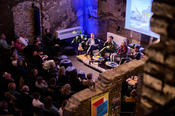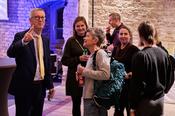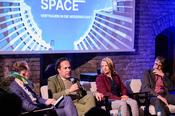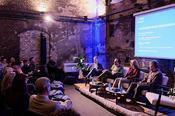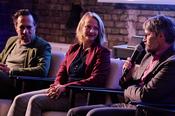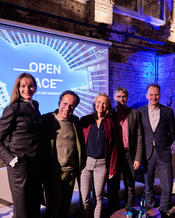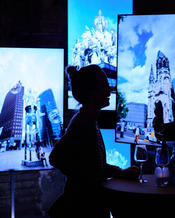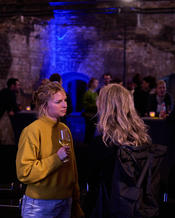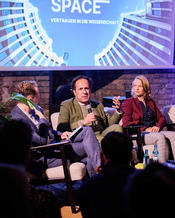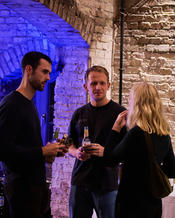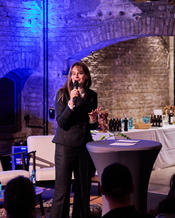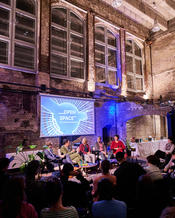Review of BUA Open Space: Trust in Science
„Trust in science” – that was the theme of the third edition of the BUA Open Space salon series organized by the Berlin University Alliance.
At a time when scientific skepticism, disinformation, and political polarization are on the rise, it is more important than ever to strengthen society's trust in research—as the basis for responsible solutions to the major challenges of our time. But what are the key factors for trust in science? What role do the media play? What about scientific integrity?
On November 1, the Berlin University Alliance invited guests to the Charité lecture hall ruins to explore these questions in depth at the third edition of the BUA Open Space salon series.
On the panel, Dr. Anne-Sophie Behm-Bahtat (Project Manager Insights at Wissenschaft im Dialog, EU research project POIESIS) provided insights into research on trust in science, Prof. Dr. Mazda Adli (Charité Berlin, Head of the Affective Disorders Research Unit and the Neurourbanistics Working Group) shared his experiences as an active science communicator, and Sascha Karberg (Head of Science, Tagesspiegel) contributed an outside perspective as a journalist.
“Trust is the key currency between science and society,” said Alexandra-Gwyn Paetz, Managing Director of the Berlin University Alliance, in her opening remarks. She added that meta-level issues such as trust in science, responsible teaching, and knowledge transfer are tasks for which the BUA feels responsible and which it would like to stimulate debate about: “We really want to get to the heart of the matter in this discussion.”
56 percent of people in Germany trust science and research
When asked about the state of trust in science in Germany, researcher Anne-Sophie Behm-Bahtat replied that, according to the 2023 Science Barometer, trust had indeed declined compared to the previous year, but that this was not yet cause for alarm: "During the coronavirus pandemic, trust rose to 73 percent, but now it has settled at around 56 percent, roughly the same level as before the pandemic. And only 10 percent of respondents have no trust in science at all, while the rest are undecided." Of the four dimensions that are particularly relevant to trust in science—scientific expertise, integrity, focus on the common good, and openness of the system to feedback—conflicts of interest, i.e., questions of integrity, were the main reason for mistrust among respondents.
Key aspect: Scientific integrity
Part of the Open Space salon series is the active participation of the audience, for whom a free chair is provided on stage. On this evening, too, several guests took their seats there to ask their questions. “What causes researchers to falsify their results?” was one of them, and it brought the discussion to structural problems in the scientific system: The pressure to publish is high, the search for third-party funding leaves little time for further loops in the research process, voluntary peer review work is not rewarded, and the evaluation system for researchers is no longer up to date.
From his perspective as a journalist, Sascha Karberg identified another problem: “Researchers must also make their own research results transparent in press releases and include not only the positive aspects, but also the problematic ones. Publicly funded research should not sound like an industry press release.”
Without good science communication, there can be no trust
As a psychiatrist, Mazda Adli is particularly aware of reservations about his field of research and therefore considered communication formats early on to establish contact with a non-academic audience, including popular science formats: “Sharing and disclosing our methodology strengthens trust in research. Conversely, it helps me as a scientist to understand the important questions that concern people.”
There is little room in the media for lengthy explanations
The panelists reported on a fundamental challenge: many people do not know how science works. Science does not provide a single clear answer, even though this was demanded during the coronavirus pandemic. During the pandemic, many people experienced the scientific process for the first time: data first had to be collected, there were different approaches, and results were repeatedly questioned. “This peculiarity of science does not fit in with the system of journalism, which needs clicks and subscriptions and therefore tends to churn out quick opinions rather than publish long texts. That is one of the challenges we face,” said Sascha Karberg.
The responsibility of politics
The role of politics was brought into the discussion by a participant from the audience: “If politicians fail to take scientific findings into account and do not translate them into legislation, they share responsibility for people's lack of trust in science.”
“Trust in science is also lost when science is exploited by politics,” added Anne-Sophie Behm-Bahtat. “Science is then no longer seen as independent. It's also about which institutions can be trusted.”
What can we do?
When asked by moderator Mads Pankow what the most important thing was for strengthening trust in science, Mazda Adli replied emphatically: “Society's participation! We have to explain why what we do is important and relevant for everyone.”
“Let actions follow words,” said Anne-Sophie Behm-Bahtat. “We know what problems the science system has, and it's time to change something.”
Sascha Karberg concluded by emphasizing the urgency of the issue: “Science is the only tool we have to make the ‘right’ decisions. This is not about belief, but about knowledge—that's why so much is at stake when people lose trust in science.”
We would like to thank everyone involved!

